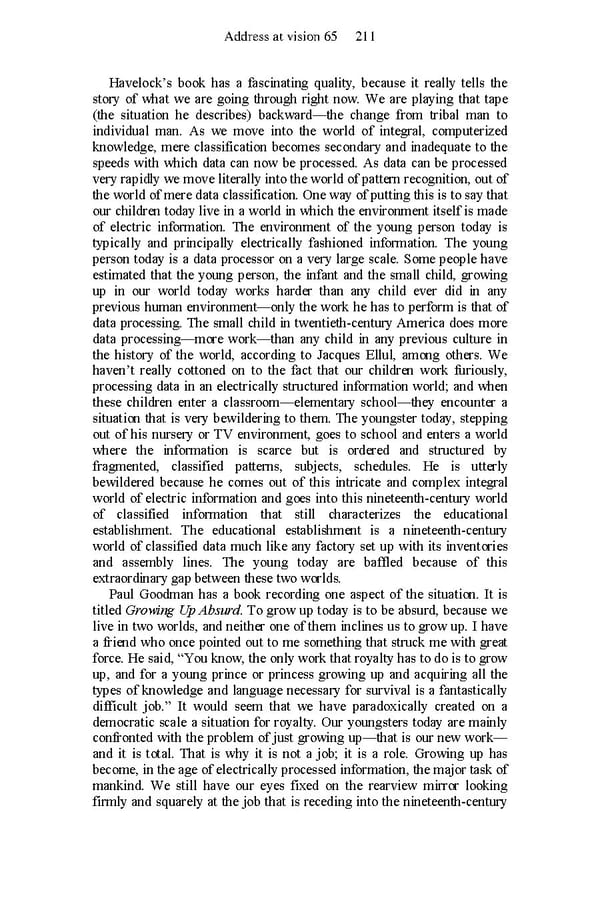Address at vision 65 211 Havelock’s book has a fascinating quality, because it really tells the story of what we are going through right now. We are playing that tape (the situation he describes) backward—the change from tribal man to individual man. As we move into the world of integral, computerized knowledge, mere classification becomes secondary and inadequate to the speeds with which data can now be processed. As data can be processed very rapidly we move literally into the world of pattern recognition, out of the world of mere data classification. One way of putting this is to say that our children today live in a world in which the environment itself is made of electric information. The environment of the young person today is typically and principally electrically fashioned information. The young person today is a data processor on a very large scale. Some people have estimated that the young person, the infant and the small child, growing up in our world today works harder than any child ever did in any previous human environment—only the work he has to perform is that of data processing. The small child in twentieth-century America does more data processing—more work—than any child in any previous culture in the history of the world, according to Jacques Ellul, among others. We haven’t really cottoned on to the fact that our children work furiously, processing data in an electrically structured information world; and when these children enter a classroom—elementary school—they encounter a situation that is very bewildering to them. The youngster today, stepping out of his nursery or TV environment, goes to school and enters a world where the information is scarce but is ordered and structured by fragmented, classified patterns, subjects, schedules. He is utterly bewildered because he comes out of this intricate and complex integral world of electric information and goes into this nineteenth-century world of classified information that still characterizes the educational establishment. The educational establishment is a nineteenth-century world of classified data much like any factory set up with its inventories and assembly lines. The young today are baffled because of this extraordinary gap between these two worlds. Paul Goodman has a book recording one aspect of the situation. It is titled Growing Up Absurd. To grow up today is to be absurd, because we live in two worlds, and neither one of them inclines us to grow up. I have a friend who once pointed out to me something that struck me with great force. He said, “You know, the only work that royalty has to do is to grow up, and for a young prince or princess growing up and acquiring all the types of knowledge and language necessary for survival is a fantastically difficult job.” It would seem that we have paradoxically created on a democratic scale a situation for royalty. Our youngsters today are mainly confronted with the problem of just growing up—that is our new work— and it is total. That is why it is not a job; it is a role. Growing up has become, in the age of electrically processed information, the major task of mankind. We still have our eyes fixed on the rearview mirror looking firmly and squarely at the job that is receding into the nineteenth-century
 Essential McLuhan Page 217 Page 219
Essential McLuhan Page 217 Page 219